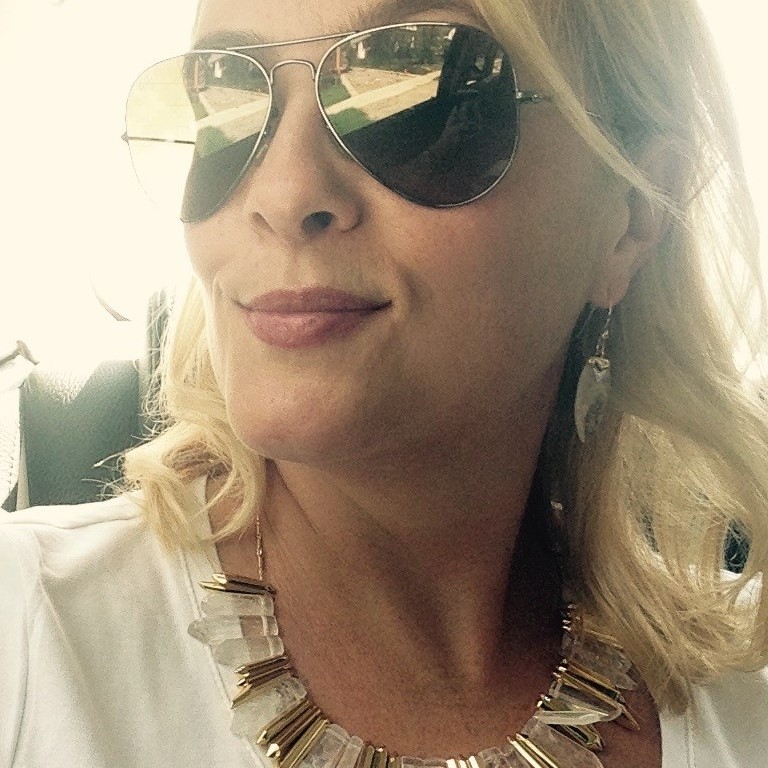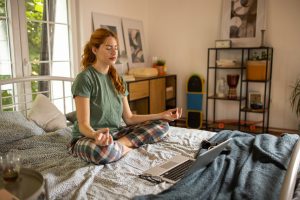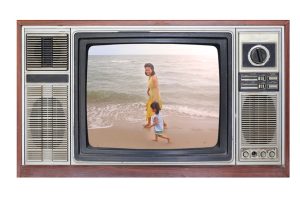What a Cancer Scare Taught Me About My Health, Women’s Bodies & Motherhood

It’s been twelve years since my cancer scare; twelve years since I finally stopped ignoring the lower back pain, horrific periods, bloating and took myself to the doctor.
What followed was the discovery of a grapefruit-sized mass on my left ovary and blood clots in both my lungs.
I was told to get my affairs in order.
Friends and family showed up at my bedside en masse, and my dogs were smuggled onto the hospital grounds. Then came six weeks of self-administered needles in the stomach as I waited for surgery and tried to accept that the best possible outcome was probably infertility, while the worst was ovarian cancer. But when I woke up in the recovery room post-surgery I heard the words I’d been hoping for, dreaming of, for months: “We were wrong, there’s no cancer.”
Instead, I had a raging case of Endometriosis.
At the time, I’d never heard of Endometriosis but as long as it wasn’t cancer I didn’t really care. Quite frankly they could have diagnosed me with Smallpox and I would have been thrilled. (I’ve since learned that Smallpox is also really, really bad).
Endometriosis is a condition where the lining of the uterus decides to grow on the ovaries, bowels, pelvis and other really inconvenient places. No one knows why this happens and there is no cure. Symptoms include debilitating pain, heavy bleeding, fatigue, extreme bloating and, in cases like mine, infertility.
Endometriosis affects one in ten women and it can take years for a proper diagnosis because the disorder is not well understood, and symptoms vary widely between sufferers. Women, and their doctors, have also been conditioned to dismiss period pain as a necessary evil of being a woman, when in fact it can sometimes be a sign of something much more sinister.
Before I got sick, I’d been trying for more than two years to get pregnant. I’d also started buying pants in a size larger, convinced my protruding belly was the result of poor eating and not working hard enough at the gym. And then there was the pain. It felt like an angry badger was trying to escape from my uterus using its teeth and a flaming-hot spoon. This had been going on for years, and it was getting worse. My body had been SCREAMING at me that something was wrong, but I blamed myself: Toughen up! More abs! Fewer carbs! Track your cycle better! I blamed myself and ignored it all until I couldn’t anymore.
Fast forward twelve years and Endometriosis has come a long way in terms of awareness. Women are no longer suffering in silence (thank you Instagram!) and doctors are learning how to better diagnose and treat the disorder. Some of this is thanks in part to March being designated as Endometriosis Awareness Month. And some of it is because the stigma around periods, in general, is slowly lifting.
In 2019, Period. End of Sentence won an Academy Award for best documentary short and the producer accepted her award screaming “I’m not crying because I’m on my period or anything!” at which point women around the world stood up gave each other a collective high-five.
Apple included a period emoji (a comically inaccurate blood drop). And in cities like Toronto, local politicians are talking publicly about improving accessibility to menstrual products in shelters and drop-ins.
Finally, periods are becoming more than just a punch line.
I used to laugh at snappy one-liners like: “I don’t trust anything that bleeds for five days and doesn’t die” because I didn’t comprehend the misogynistic subtext that treats menstruation like something sinister. By all means, let’s joke about our periods, but let’s do it in a way that acknowledges menstruation as something normal, though inconvenient, and not something to be feared.
Because here’s the thing: women have been menstruating since the BEGINNING OF TIME yet we’ve been conditioned to treat it like a secret, to pretend it doesn’t exist. A man can jovially head to his bathroom “throne” with a newspaper tucked under one arm and we’ll all giggle and roll our eyes, embracing the stereotype of the funny, pooping man. And why not? Pooping is natural, everyone does it!
Yet almost every woman I know refers to the trip between her desk and the public washroom as “running the gauntlet” as she tries to smuggle her feminine hygiene products up her sleeve, down her top or inside her shoe. Periods shouldn’t be secret or embarrassing and by treating them as such we perpetuate the idea of shame and encourage ourselves to stay silent, even when our periods are trying to tell us something is wrong.
Truthfully, even if periods hire the same PR firm that worked wonders for kale and kombucha I would still tuck my tampon up my sleeve because it’s none of anyone’s damn business what I do in the bathroom. (Except my kids and pets, apparently). But I’m interested in how some of our body functions seem to welcome comment and discussion and others don’t, despite both being perfectly normal and natural.
Why does the man who claims to “love women”, who takes intense pleasure in her body and all the amazing things it can do, get weirded out by anything period-related? Why does the woman who proudly refers to stretch marks as having “earned her stripes” feel the need to be silent about period pain? What’s it going to take to get us to love, or at least accept, the good, the bad and the ugly of women’s bodies?
I hope the period’s newfound celebrity will encourage us to talk about periods and period pain because when it comes to Endometriosis and other below-the-belt health concerns, our shyness has to stop. Endometriosis is painful, debilitating, and life-altering. Ask a sufferer how many times she’s called in sick to work or changed her plans because of a flare-up and you’ll see just how much her quality of life is compromised.
I’m fortunate that surgery put my disorder into remission. As awful as the whole experience was, I would do it all again for the sake of a normal period. And while my good ovary still goes nuts when I see, smell or snuggle a baby, it is this whole mess that led me to become an adoptive mother, which is something I wouldn’t change for anything.
And when I have the period talk with my daughter, I work hard to convince her that yes, it’s a private thing, but there’s no need to get embarrassed about something your body does naturally, something you have no control over.
Some people believe menstruation makes you a woman, but I believe being able to talk about it without shame or embarrassment is what does it. Period. End of Story.
For more information on Endometriosis and Endometriosis Awareness Month visit:
















